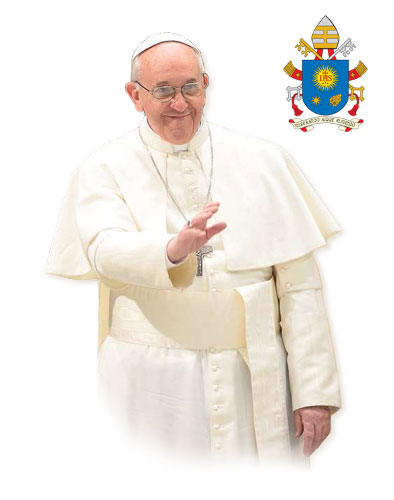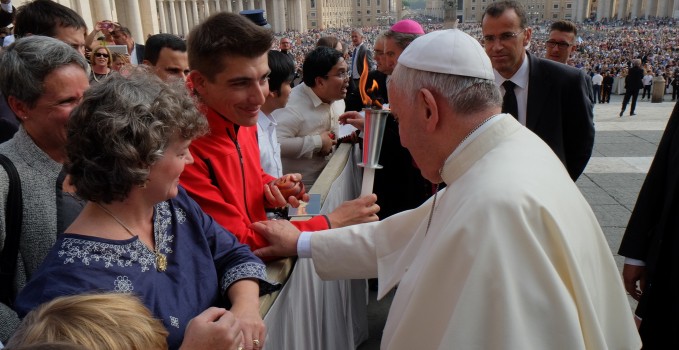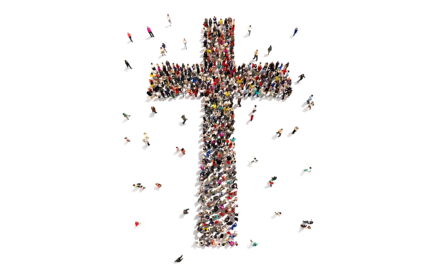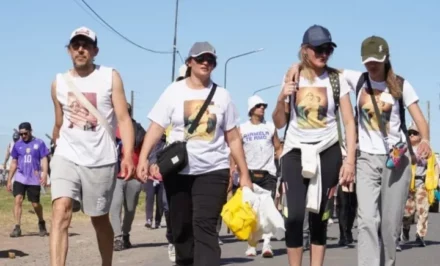org. Every part of the Church, and many others outside of her – believers or non-believers – have received Pope Francis` clear and hope-filled words. They are also words that motivate us to assume the responsibility we all have to build a world in accordance to the Will of God, in the strength of the Spirit and through the way of Christ. Cardinals and bishops, priests, men and women religious, novices and seminarians, families, the youth and elderly, communities and institutes have received this challenge to go out “onto the street” to take – not a utopian hope – but concrete deeds in living evangelization projects to all men and women wherever they may be. And if they are on the “outskirts” then we have to go there, with all the risks and dangers it may include. He repeats to us constantly: I prefer an injured church, because she goes out to serve, to a Church that is sick because of her self-absorption. Testimony to this can be found in the section of Schoenstatt.org where on a weekly basis texts are selected which motivate us on our own pilgrimage toward the 2014 Jubilee. Undoubtedly, because we are the Church, these words are also directed to us. How happy must our Father not be with this missionary impetus which is given to us from the very heart of the Church! (Fr. José María García)
We are transmitters of the One who saved us all. And we can only transmit this if we take up the life of this someone called Jesus in our own lives, in our flesh, in our history. This is testimony. Testimony.
Audience, 25.10.2014

Centred on Christ and on the Gospel, you can be the arms, hands, feet, mind and heart of a Church “that goes out.” The Church’s path is to go out to find those who are far out on the peripheries, to serve Jesus in each person who is marginalized, abandoned, without faith, deceived by the Church, a prisoner of his own selfishness. “Go out” also means rejecting ‘self-referencing’…in all its forms, it means knowing how to listen to someone who is not like us, learning from everyone with sincere humility.
Audience with the Communion and Liberation Movement, 7.3.2015
Remember that the charism is not at the centre, there is only one person in the centre, Jesus Christ. When I put my spiritual method, my spiritual path, my way of putting it into practice at the centre, then I step off the path. All spirituality, all charisms in the Church should be ‘de-centred’: Only the Lord is at the centre! This is why when Paul, in his first letter to the Corinthians speaks about charisms, about this beautiful reality of the Church, the mystical Body, he ends up speaking of love, that is, that which comes from God, which belongs to God, and allows us to imitate him. Never forget this.
Audience with the Communion and Liberation Movement, 7.3.2015
Many people live their lives in a difficult way, in a difficult manner; but if I have a worldly heart, I will never be able to understand this. With a worldly heart it is not possible to comprehend the necessities and the needs of others. With a worldly heart, you can go to Church, you can pray, you can do so many things. But Jesus, at the Last Supper, in the prayer to the Father, what did he pray? ‘But, please, Father, protect these disciples so that they do not fall in the world, so that they do not fall into worldliness.’ It is a subtle sin, it is more than a sin: it is a sinful state of the soul.
Mass at Santa Marta, 5.3.2015
But how can I be converted? Learn to do good! Conversion. The dirt in the heart cannot be removed in the same way as we remove a stain: we go to the laundromat and come out clean…It is washed out by ‘doing,’ taking a different path, a path other than that of evil. Learn how to do good! In other words, the way of doing good. And how do you do good? It’s easy! ‘Search for justice, rescue the oppressed, give justice to the orphan, defend the cause of the widow.’ We remember that in Israel the poorest and neediest were the orphans and widows: carry out justice, go where the wounds of humanity are, where there is so much pain…in this way, doing good, you will wash out your heart.
Mass at Santa Marta, 3.3.2015
So, even before words, it is your witness of life that manifests the heart of Christ’s revelation: that God loves man to the point of laying down His life for us and that he was raised by the Father to give us the grace to give our lives for others. Today’s world badly needs this great message. How much solitude, how much suffering, how much distance from God in the many peripheries of Europe and America, and in many cities of Asia! Today, in every latitude, humanity greatly needs to hear that God loves us and that love is possible! These Christian communities, thanks to you missionary families, have the essential task of making this message visible. And what is this message? Christ is risen, Christ lives. Christ lives amongst us.
To the families of the New Cathechumenal Way, 5.3.2015
On several occasions I have insisted that the Church has to move from a pastoral ministry of mere conservation to a decidedly missionary pastoral ministry (cf. ibid., N. Evangelii gaudium, 15). How often, within the Church, do we keep Jesus inside and don’t let him out. …. How often! This is the most important thing to do if we do not want the waters to stagnate within the Church.
To the families of the New Cathechumenal Way, 5.3.2015
Everything in our life, today as in the time of Christ, begins with an encounter. An encounter with this Man, the carpenter from Nazareth, a man like all others but at the same time different. We think of St. John’s Gospel, which tells the story of the disciples’ first encounter with Jesus. Andrew, John, Simon: they felt as if they were seen in their depths, known intimately, and this elicited a surprise in them, an astonishment that, immediately, made them feel connected to Him. Or when, after the resurrection, Jesus asks Peter: “Do you love me” and Peter answers “yes,” that ‘yes’ was not the result of a force of will, it did not come only from the decision of the man Simon: it came, above all, from Grace, it was that “premier,” that precedes Grace. This was a crucial discovery for St. Paul, for St. Augustine, and for many other saints: Jesus Christ is first, Jesus Christ always comes in first, precedes us. When we arrive, He is already waiting for us. He is like the flower of the almond tree: It is the flower that blooms first announcing the arrival of spring.
Audience with the Communion and Liberation Movement, 7.3.2015
(Translation adapted from www.vatican.va, www.osservatoreromano.va, Radio Vaticano)
![]()
- Audience for the Schoenstatt Movement, Oct 25, 2014














